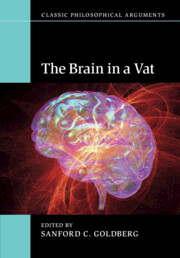Book contents
- Frontmatter
- Contents
- List of contributors
- Acknowledgments
- 1 Introduction: Putnam's reflections on the brain in a vat
- Part I Intentionality and the philosophy of mind and language
- Part II Epistemology
- Part III Metaphysics
- 9 Brains in vats and model theory
- 10 Realism, skepticism, and the brain in a vat
- 11 Rethinking semantic naturalism
- 12 Internal to what? Contemporary naturalism and Putnam's model-theoretic argument
- 13 The model-theoretic argument: from skepticism to a new understanding
- 14 Eligibility and ideology in the vat
- Bibliography
- Index
11 - Rethinking semantic naturalism
from Part III - Metaphysics
Published online by Cambridge University Press: 05 June 2016
- Frontmatter
- Contents
- List of contributors
- Acknowledgments
- 1 Introduction: Putnam's reflections on the brain in a vat
- Part I Intentionality and the philosophy of mind and language
- Part II Epistemology
- Part III Metaphysics
- 9 Brains in vats and model theory
- 10 Realism, skepticism, and the brain in a vat
- 11 Rethinking semantic naturalism
- 12 Internal to what? Contemporary naturalism and Putnam's model-theoretic argument
- 13 The model-theoretic argument: from skepticism to a new understanding
- 14 Eligibility and ideology in the vat
- Bibliography
- Index
Summary
In Putnam's characterization of metaphysical realism, this position is committed to a correspondence conception of truth as well as to the claim that truth outstrips empirical adequacy. Putnam's model-theoretic argument seeks to refute metaphysical realism by arguing that, on this conception of truth, truth and empirical adequacy must coincide. It has been noted in the literature that the argument involves as an auxiliary premise a thesis sometimes called “semantic naturalism,” according to which semantics is an empirical science like any other. At the time when the model-theoretic argument was presented, semantic naturalism was taken to imply, among other things, that if truth is indeed to be defined in terms of a correspondence relation, then that relation ought to be characterizable in physical terms. This chapter argues that metaphysical realists should reject semantic naturalism as a fundamentally physicalist-reductionist program. It does not follow that they must abandon the view that semantics is to be pursued as an empirical science. This chapter points to some promising approaches to semantics that are scientific without being physicalist and that do not support Putnam's model-theoretic argument.
The model-theoretic argument
Hilary Putnam's (1978, 1980) widely discussed model-theoretic argument (MTA) is directed against metaphysical realism, two key tenets of which – in Putnam's statement of the position – are correspondence truth
(CT) Truth is a matter of correspondence to the facts. and methodological fallibism
(MF) Even an empirically adequate theory – a theory that is predictively accurate and that satisfies any theoretical virtue one may like – may still be false.
The conclusion of the MTA is that MF is false: an epistemically ideal theory is guaranteed to be true.
Despite its somewhat intimidating name, the core of the MTA is quite straightforward, and involves no model theory beyond what is commonly covered in an intermediate logic course. The argument can be usefully split into three parts. The first part starts by assuming that the world is infinite, and then considers an empirically adequate theory that has (also) infinite models but that is otherwise arbitrary. On some interpretations of this theory's language, the theory will no longer be empirically adequate.
- Type
- Chapter
- Information
- The Brain in a Vat , pp. 174 - 189Publisher: Cambridge University PressPrint publication year: 2016

